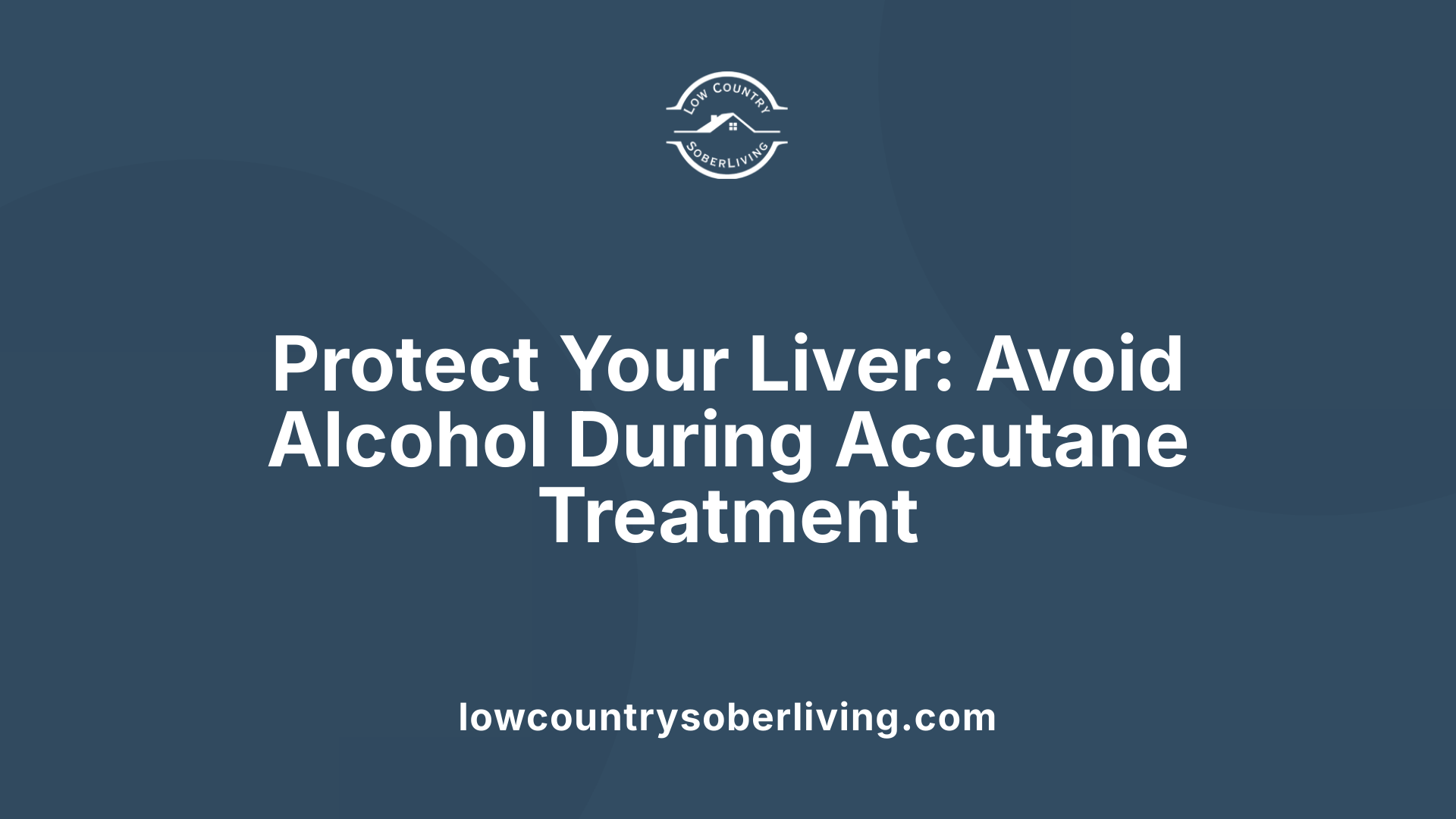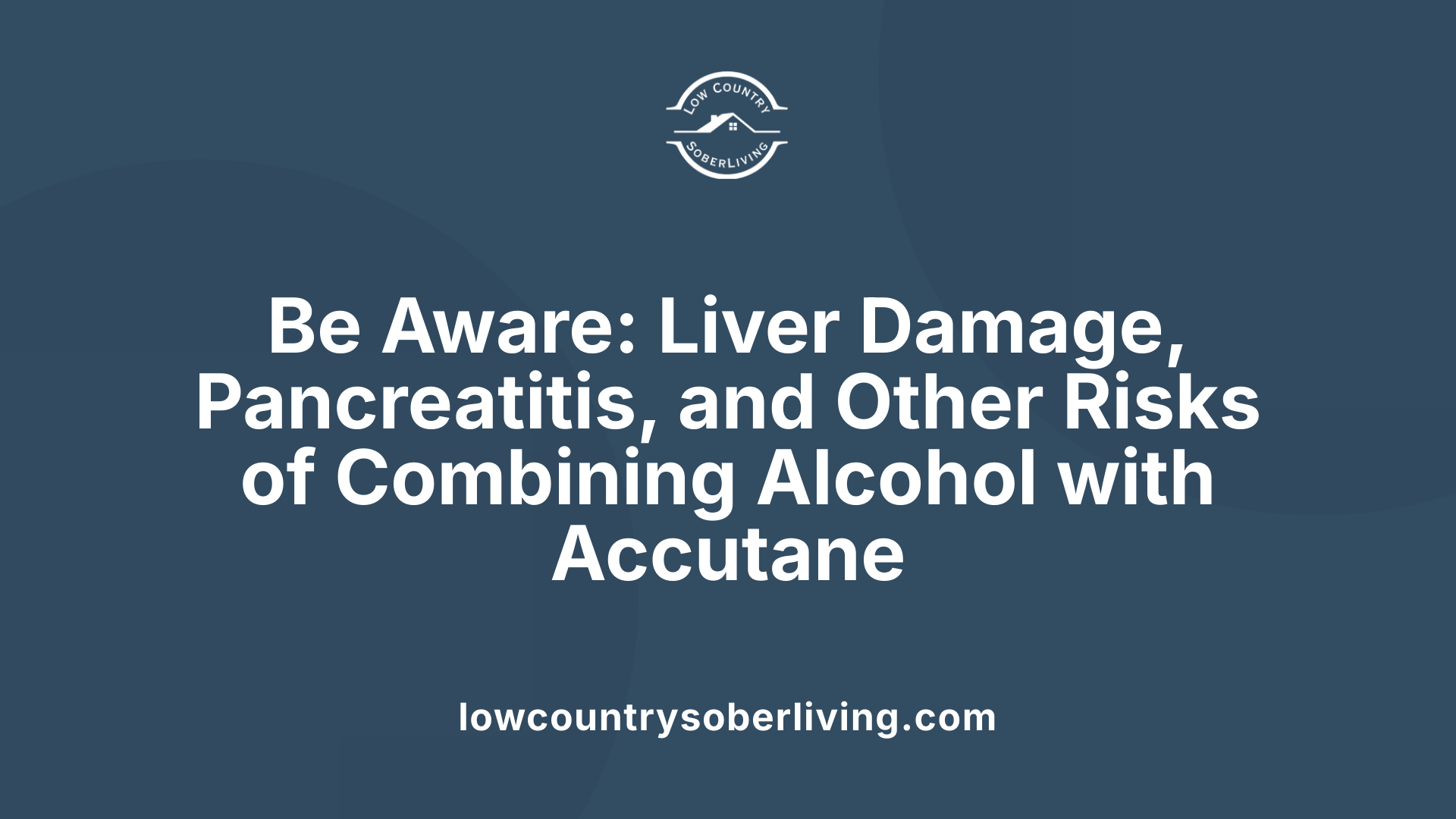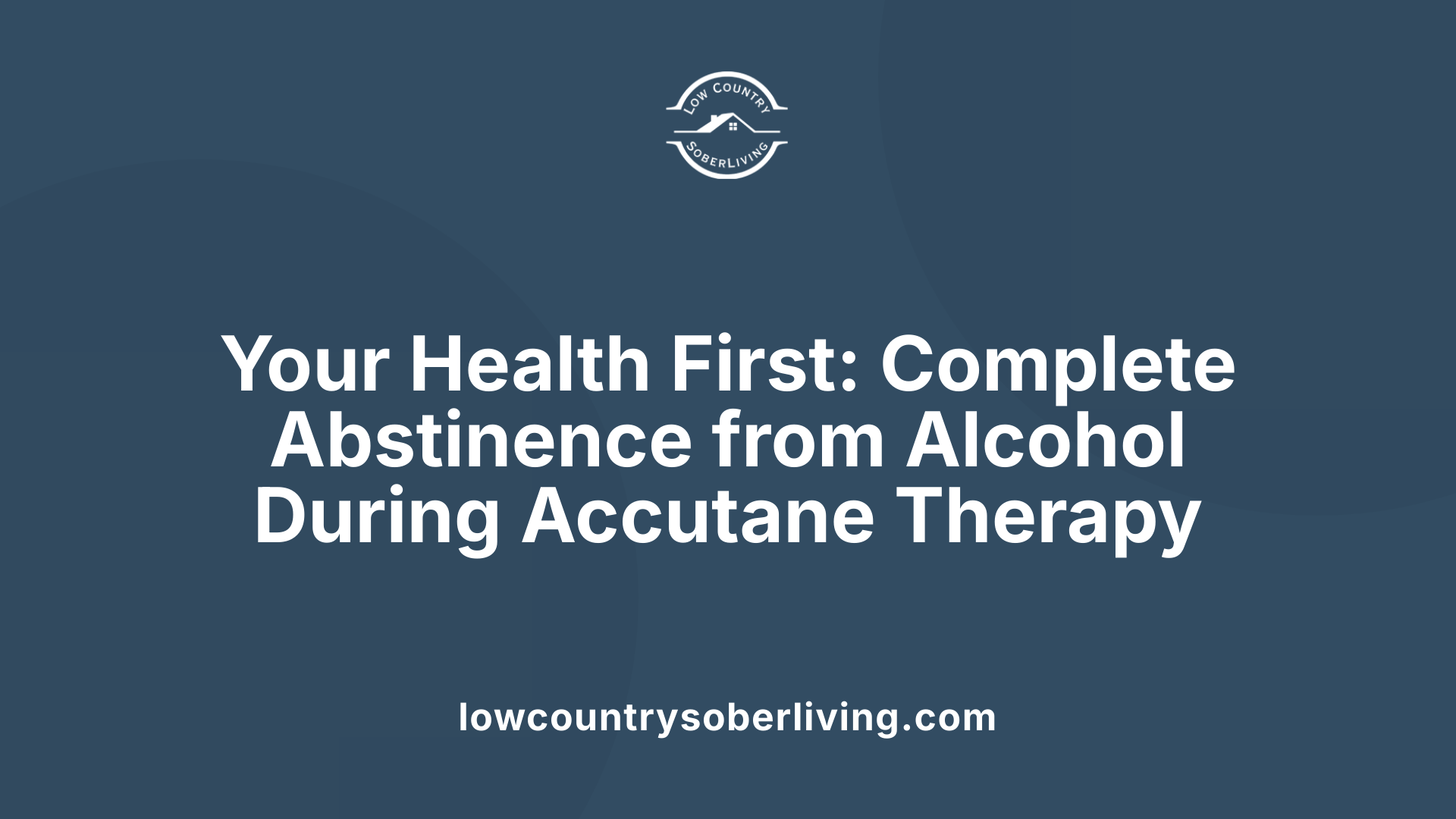Why Caution Is Essential When Combining These Substances
Accutane (isotretinoin) has revolutionized the treatment of severe acne but comes with significant precautions, especially regarding alcohol consumption. Both substances are processed primarily by the liver, and their interaction can lead to serious health complications. This article explores the potential risks, medical guidelines, and safety considerations regarding alcohol use during Accutane therapy, emphasizing the importance of informed decisions and professional guidance.
The Impact of Alcohol on Liver Health During Accutane Treatment
What should be avoided while on Accutane?
While undergoing treatment with Accutane (isotretinoin), patients must exercise caution regarding alcohol consumption. Alcohol should be completely avoided, as it significantly increases the risk of liver damage. Both Accutane and alcohol are processed in the liver, and their combination can lead to inflammation, scarring, or even liver failure.
In addition, patients should refrain from using other medications or supplements that could aggravate side effects. For example, vitamin A supplements, herbal products like St. John's Wort, and other acne therapies such as benzoyl peroxide or salicylic acid should be avoided unless approved by a healthcare provider. Women capable of pregnancy should use effective contraception because Accutane can cause severe birth defects. It’s also essential not to donate blood during treatment or for at least one month after stopping Accutane.
Avoiding alcohol is vital not only to prevent liver damage but also to minimize dryness, dehydration, and mental health side effects associated with Accutane. Proper consultation with a healthcare professional helps ensure safe treatment progress.
What are the health risks and safety considerations of alcohol consumption during Accutane (isotretinoin) treatment?
Consuming alcohol during Accutane therapy presents multiple health risks that require serious consideration. Since both substances are metabolized through the liver, alcohol intake can amplify liver strain, leading to inflammation, increased liver enzymes, and potential liver damage or failure.
Moreover, alcohol can significantly elevate triglyceride and cholesterol levels, increasing the risk of pancreatitis, a severe condition marked by intense abdominal pain, nausea, and vomiting. It can also heighten the side effects of dryness, such as cracked lips, dry skin, and eyes, making physical discomfort worse.
Mental health is another critical area impacted by alcohol use during treatment. Alcohol is a depressant and has the potential to worsen mood swings, depression, or anxiety, which are already associated with isotretinoin. The risk of impaired judgment, which could lead to unsafe behaviors or pregnancy, is also heightened.
To ensure safety, most healthcare providers recommend complete abstinence from alcohol during the entire course of Accutane treatment and for at least a month after discontinuation, allowing the medication to clear from the body. Regular blood tests to monitor liver enzymes and lipid profile are important if alcohol consumption occurs. Pregnant women or women planning to conceive should avoid alcohol altogether due to the risk of severe fetal deformities.”}]}
Understanding the Interaction: How Alcohol and Accutane Affect Your Body

How does alcohol interact with Accutane, and what are the potential side effects and dangers?
Alcohol can significantly worsen the side effects of Accutane (isotretinoin) and pose serious health risks. Both substances are processed by the liver, which means they can strain this vital organ when combined. This interaction increases the risk of liver inflammation, scarring, and even liver failure.
One of the most concerning risks is an elevation in blood triglyceride levels. High triglycerides can lead to pancreatitis, a dangerous condition characterized by severe abdominal pain, nausea, and vomiting, which can become life-threatening if not treated promptly.
In addition to liver-related issues, alcohol intensifies common side effects of Accutane such as dry skin, cracked lips, and dehydration. It can also worsen mental health problems like depression and mood swings, which are already associated with Accutane therapy.
Pregnant women or women planning to conceive should tread carefully, as alcohol consumption adds to the risk of severe birth defects linked with Accutane use. Given these potential dangers, healthcare professionals universally recommend abstaining from alcohol during the entire period of Accutane treatment and for at least one month after stopping the medication. This precaution helps minimize liver damage, hormonal imbalances, and other serious complications, safeguarding overall health.
What are the effects of alcohol on the efficacy and safety of Accutane treatment?
Alcohol significantly compromises the safety and effectiveness of Accutane therapy. Since both are metabolized in the liver, alcohol can cause liver inflammation and elevate blood lipids, including cholesterol and triglycerides. These changes not only pose health hazards but also interfere with how well the medication works.
Increased liver strain from alcohol consumption can lead to abnormal liver enzyme levels, potentially prompting treatment interruptions or discontinuation. Moreover, alcohol can aggravate the dehydration, dry skin, and irritation typically caused by Accutane.
The presence of alcohol in the body also heightens the risk of pancreatitis due to the further increase in triglyceride levels. Because Accutane remains in the system for over a week after each dose, consuming alcohol during this period can lead to unintended interactions. Even minimal alcohol intake can pose risks, and there is no established safe window for drinking during treatment.
To ensure optimal safety and treatment success, healthcare providers advise complete abstinence from alcohol for the entire duration of the therapy and recommend regular monitoring of liver function. If patients find it difficult to abstain, they should consult their healthcare provider to evaluate their individual risk factors and find suitable alternatives or strategies.
Health Risks and Precautions: Liver Damage, Pancreatitis, and More

What are the risks of liver damage, pancreatitis, and other health complications from combining alcohol with Accutane?
Using alcohol together with Accutane (isotretinoin) poses significant health dangers, primarily affecting the liver. Both alcohol and the medication are processed in the liver, and their combined effect can lead to inflammation, scarring, or even severe liver failure. These risks are especially heightened when alcohol consumption is excessive, as it causes additional strain and damage.
One of the critical concerns is the risk of pancreatitis, a potentially life-threatening condition characterized by severe abdominal pain, nausea, and vomiting. Accutane itself can raise blood triglycerides and cholesterol levels, and alcohol can further increase these blood fats. Elevated triglycerides—particularly levels above 800 mg/dL—are associated with a high risk of pancreatitis. When these two substances are combined, the risk increases significantly, risking acute pancreatitis that requires immediate medical attention.
Beyond liver damage and pancreatitis, the combination can lead to various other health complications. These include dehydration, dry skin and eyes, and mood disturbances such as depression or anxiety. Accutane is known to affect mental health, and alcohol’s depressant effects can worsen mood swings or depressive symptoms.
For women of childbearing age, the dangers are even more severe. Accutane can cause serious birth defects if pregnancy occurs during treatment. Alcohol further increases this risk by impairing judgment and increasing the likelihood of unprotected sex, which can lead to unintended pregnancies while on the medication.
Medical guidelines universally emphasize the importance of avoiding alcohol during Accutane therapy. Patients are advised to abstain from alcohol throughout the course of treatment and for at least one month after completing the therapy. This duration allows the medication to fully clear from the body, reducing the risk of adverse effects.
Regular monitoring is essential if patients choose to consume alcohol. Blood tests to assess liver function and blood lipid levels help track any emerging issues early and enable timely intervention. Patients with pre-existing liver problems, high cholesterol, or other health conditions should consult their healthcare provider before considering alcohol use.
In summary, the combination of alcohol and Accutane significantly raises the risk of liver damage, pancreatitis, and other serious health issues. Abstinence from alcohol during treatment is the most effective way to minimize these risks. Healthcare panels and dermatologists strongly recommend complete avoidance, emphasizing that the potential harm outweighs any benefits of moderate drinking while on this medication.
Managing Alcohol Intake: Guidelines for Safe Consumption

How long after taking isotretinoin can I drink alcohol?
Given the nature of isotretinoin's processing in the body, most healthcare experts recommend waiting at least one month after finishing treatment before consuming alcohol. Isotretinoin has a long half-life, which means it can stay in the system for several weeks, continuing to impact liver function and blood lipid levels even after discontinuation.
Alcohol can strain the liver further, increasing the risk of inflammation, scarring, or even liver failure. It can also exacerbate side effects such as dry skin, dehydration, mood swings, and vision issues.
To enhance safety, always consult your prescribing doctor regarding when it is appropriate to start drinking again. They can assess your individual health profile, including dosage, duration of treatment, and liver function, guiding you on the safest timeline to resume alcohol consumption.
The safest approach is to follow your healthcare provider’s advice, which might include waiting longer if you have preexisting liver conditions or experienced significant side effects during treatment.
Conclusion: Ensuring Safety During Accutane Therapy

What is the medical advice regarding alcohol use during isotretinoin therapy?
Healthcare professionals universally recommend avoiding alcohol entirely while undergoing isotretinoin (commonly known as Accutane) treatment. This caution stems from the fact that both alcohol and the medication are processed by the liver, which can lead to significant strain and potential damage to this vital organ.
Dr. Adam Mamelak, a board-certified dermatologist, stresses that alcohol not only increases the risk of liver toxicity but also exacerbates many of the side effects associated with Accutane. These include dry skin, dehydration, increased cholesterol, and triglyceride levels, as well as mood swings and depression. Drinking alcohol can also intensify other adverse effects like nausea, stomach pain, and flu-like symptoms.
Patients should avoid alcohol during the entire course of treatment, which typically lasts four to six months. It's equally important to abstain for at least one month after stopping the medication, considering that isotretinoin can remain in the system for up to 8 days post-treatment. Even small amounts of alcohol are risky because the substance can accumulate in the body over time.
Physicians often recommend regular blood tests to monitor liver function and blood lipid levels during treatment if alcohol consumption occurs. This monitoring helps detect early signs of liver stress or elevated triglycerides, which could lead to dangerous complications such as pancreatitis.
It is also essential for patients to read ingredient labels carefully, as alcohol can be present in many over-the-counter products, foods, and beverages. Patients who find it difficult to abstain from alcohol due to personal or social reasons should openly discuss this with their healthcare provider. In some cases, support or counseling might be suggested to help with alcohol use.
Discontinuing alcohol use is especially critical for women of childbearing age, as alcohol consumption can further increase the risk of birth defects associated with fetal development issues caused by isotretinoin.
In summary, the safest approach is complete avoidance of alcohol during and after Accutane therapy. Patients should stay well-informed about potential risks and follow their healthcare provider’s guidelines closely to ensure both effectiveness of treatment and overall health safety.
Prioritizing Health: The Absolute Necessity of Abstinence
In conclusion, the combination of alcohol and Accutane (isotretinoin) poses significant health risks that outweigh any perceived benefits of moderate drinking during treatment. From potential liver damage and pancreatitis to worsening mental health effects and the risk of birth defects, the dangers are clear. Patients should adhere to medical guidelines strictly, abstaining from alcohol during the entire course of treatment and for at least a month afterward. Regular monitoring of liver function and lipid levels, along with open communication with healthcare providers, are essential to ensure safe and effective treatment. Prioritizing health and safety not only enhances the chances of successful acne treatment but also minimizes the risk of serious, lifelong health complications.
References
- The Risks of Consuming Alcohol While Taking Accutane
- Risks and Safety Guides of Mixing Accutane and Alcohol
- What Happens If You Drink On Accutane? - Honeydew
- Common questions about isotretinoin capsules - NHS
- Is Alcohol Safe With Accutane? - Sanova Dermatology
- Mixing Accutane and Alcohol: Why They Shouldn't Be Taken Together
- The Dangers of Combining Accutane and Alcohol | Epiphany Wellness
- Accutane and Alcohol: Safety Guidelines & Risks You Should Know
- A dermatologist's take on whether you can drink on Accutane - Miiskin

